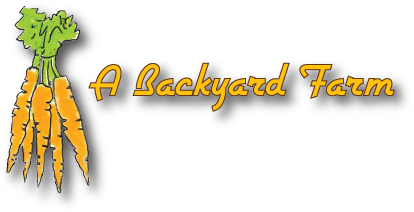Soil is Alive
Some gardeners share my sentiment when I say, "I am growing soil as well as plants." A huge part of your gardening success lies in the soil as there are millions of bacteria and fungi thriving in the growing medium of your garden. All of this life in our soil helps our plants grow better and taste better. They help plants take up the nutrients from the compost. This group of beneficial life is known as"mychorrhizal fungi". They form colonies around the roots to help the plant take up food, water and and helps it fight diseases.
One way to maintain this life is to establish permanent raised beds, which you do not walk on, thereby eliminating compaction. Further more, you will not need to till or turn over your garden. Your soil will stay light and friable, so the need to till will not be there.
There are many advantages of a no till system: almost no weeds, soil life is maintained, and less work.
A weedLESS garden is quite possible. Thousands of weed seeds are buried in the soil waiting to be exposed to light and air. One of the main reasons we have weeds is because of tilling. When we turn up the soil, weed seeds rejoice because they have access to sunlight and water they need to grow. We till because there are too many weeds to deal with by hand. Also because the soil is compacted from walking on it all summer. It is an endless cycle. So where to begin? Start with a raised bed at least 8" deep. I like to remove the grass and dig a shovel depth deep, but it isn't necessary. I then add compost, manure, shredded leaves, worm castings, perlite or vermiculite and high quality black dirt. You can skip the digging, and add this to a pre-made box no wider than four feet to allow you to reach across the bed on all sides. Staple landscape fabric to the bottom of your bed if you are concerned with soil contamination. This is mainly an issue in the city.
Tilling and turning over the soil wrecks the intricate web of life that is so crucial for plants to thrive. Worms are disturbed along with the mychorrhizal life previously mentioned. If you leave the soil alone, the worms and all the other life residing there will keep the soil loose for you and eliminate the need for you to do it. Instead of all the work every spring and fall, add generous amounts of mixed compost, shredded leaves, and grass clippings (from lawns not treated with herbicide and conventional fertilizer). After a few years of doing this, you will be able to use your hands to plant your transplants.
Adding all of this organic matter to your soil increases water holding capacity, brings in more worms (which provide you with some of natures best fertilizer), helps create spaces for the roots to breathe, and keep the soil loose. Organic matter such as compost is the best mulch you can give your plants. It keeps the weeds at bay, helps maintain moisture, and protects the soil from erosion.
If you feel the need to till and dig up your garden, you may keep a two foot by two area just for fun. But trust me...this will be the area you are weeding the most. Using the no-till method, any weeds you do get will easily come out since the soil is so friable. When my garden was 15'x25' I spent no more than five minutes a day pulling out weak spindly weeds. Weeding was sort of therapeutic.
When planning your garden this winter, consider going against your tradition and make this the last year you till your soil. Establish permanent planting and walking areas and your garden will be a joy to spend time in.
